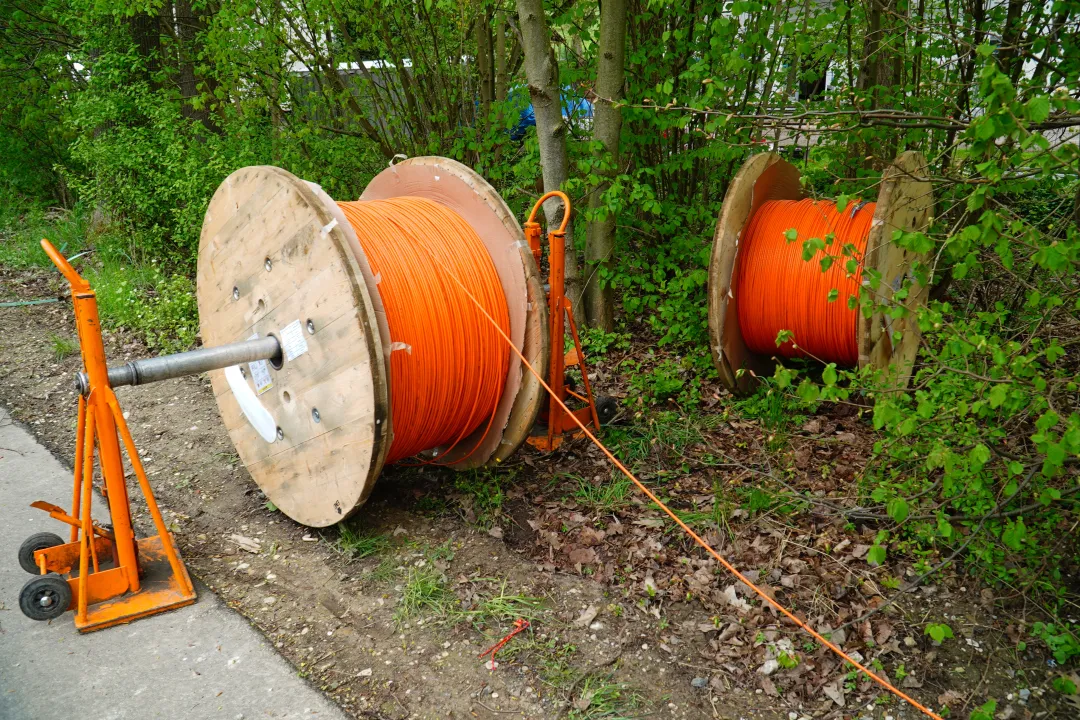Bridging the digital divide for smart and sustainable regions
For communities and regions across Europe, bridging the digital divide is key to unlocking new opportunities, supporting economic resilience, enabling competitiveness, and promoting sustainability.
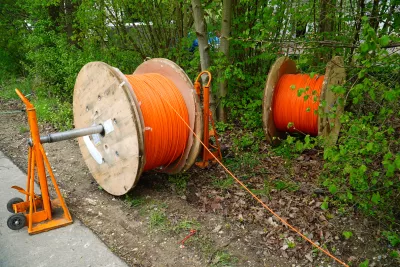
Page contents
In today’s increasingly digital world, access to reliable internet and high-speed digital connectivity is as crucial as access to electricity and roads - especially in rural and remote areas. For communities and regions across Europe, bridging the digital divide is key to unlocking new opportunities, supporting economic resilience, enabling competitiveness, and promoting sustainability.
This was the focus of discussions during the recent EU Regions Week event organised by the European Broadband Competence Offices (BCO) Network, together with the European Commission Directorates-General for Agriculture and Rural Development (DG AGRI), and for Regional and Urban Policy (DG REGIO). Representatives from committed European bodies, including among others the BCO Network, the EU CAP Network, the European Committee of the Regions, and the European Regions Research and Innovation Network (ERRIN), came together with local and regional authorities from across Europe to explore how digital infrastructure investments can foster smart and sustainable rural regions, as part of a holistic approach.
A holistic approach
Despite their immense potential, many regions and rural areas in the EU remain at a disadvantage, excluded from many opportunities that could make them more attractive, competitive and sustainable. Founded on a lack of access to broadband infrastructure combined with a need for greater digital literacy and skills, the digital divide continues to hold these regions, and their citizens and businesses, back from fully participating and benefitting from online opportunities, modern services, and digital technologies.
As stated by Catherine Wendt, European Commission Head of Unit for Smart and Sustainable Growth within DG REGIO, the digital divide is a cause for concern from the economic, as well as social and territorial, cohesion perspectives, especially given that technology is a driver of economic convergence. Not only does it impact citizens’ “right to stay in a place they call home”, it can cause regions to fall into the “development trap”, whereby less developed regions are unable to catch up, and become digitally marginalised.
As evidenced by the discussions during the EU Regions Week event, a holistic approach is needed, not only to overcome the digital divide, but to truly capitalise on the opportunities and the potential that digitalisation and innovation can bring. In order to truly foster the development of smart, sustainable and competitive regions, we must combine the necessary infrastructure and skills with cross-border and cross-sector knowledge-sharing and collaboration.
Collaborating for smart, sustainable, competitive and connected regions
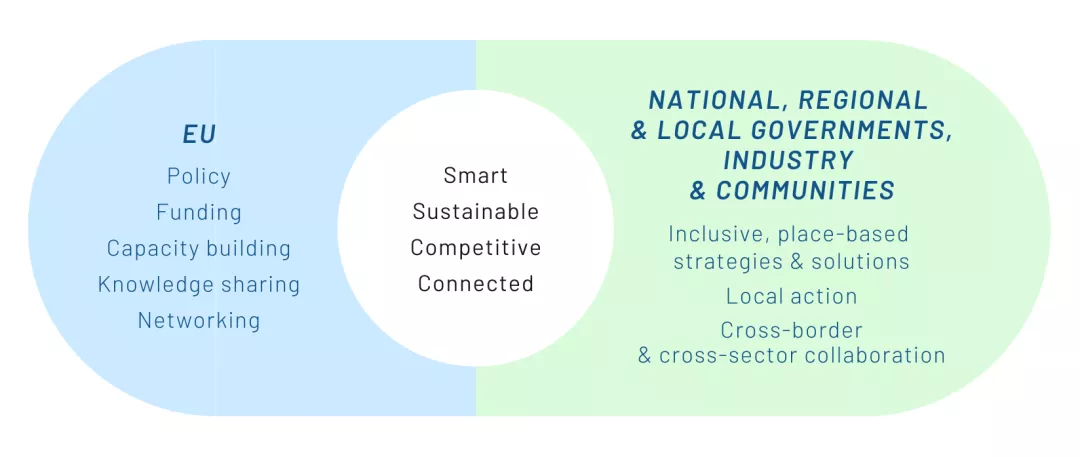
Collaboration for sustainable transformation
Collaboration across government, industry and local communities is vital to develop and implement sustainable digital solutions to common challenges. Markku Markkula, Vice-President of the European Committee of the Regions, highlighted the importance of “bench learning” initiatives, which encourage knowledge sharing and co-creation across municipalities and regions. LORDIMAS (Local and Regional Digital Innovation Management and Advisory Services), for example, is an EU-supported platform that helps local governments benchmark their digital transformation progress and develop tailored strategies that suit their communities’ unique needs. Such collaborative frameworks help communities learn from successful models, saving time and resources.
In terms of fostering growth and innovation, Ms Pirita Lindholm, Director at ERRIN, the European Regions Research and Innovation Network, underlined the need for the different actors to work together on issues of governance and create the right conditions for investment. Regions can have a vital role in scaling developments, but a more connected innovation ecosystem in Europe would allow greater regional competitiveness. This could involve connecting the initiatives themselves (such as digital innovation hubs and regional innovation valleys), as well as combining relevant complementary EU policies, such as industrial and research and innovation policies, to mobilise different industries’ instruments.
The fundamentals: broadband connectivity and digital skills
Before we can roll out innovative solutions and digital services, we must address the fundamentals underpinning the digital divide: the lack of universal high-speed connectivity, and insufficient digital skills and literacy.
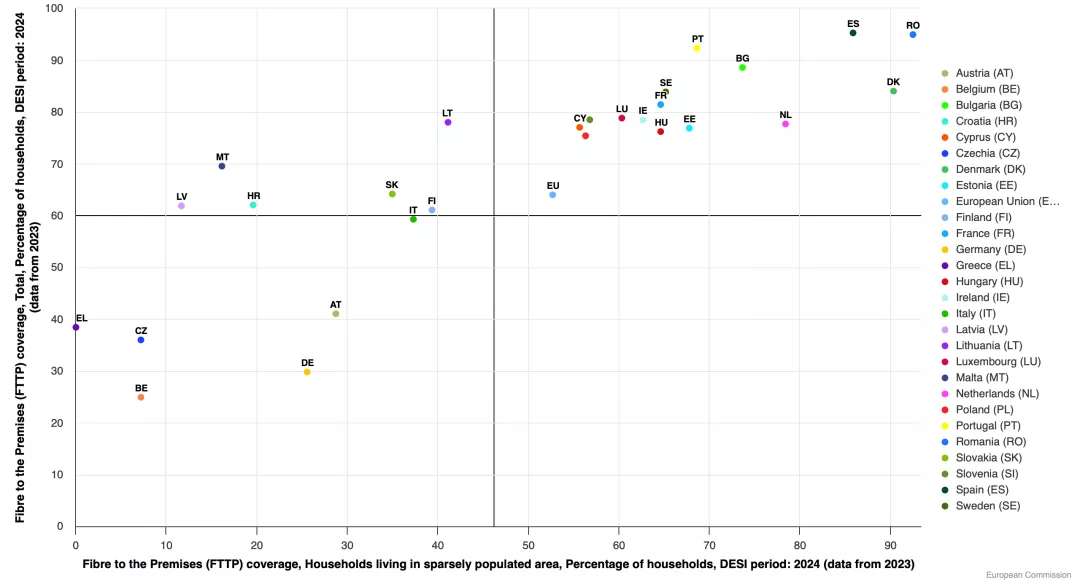
In the chart above, sourced from the 2024 Digital Decade Report and based on data from 2023, we take the example of Fibre-to-the-Premises (FTTP) coverage at the country level, compared to sparsely populated areas. In only four Member States is rural coverage on par with the national average, whilst in eight countries, rural coverage reaches less than 30% of households.
Mapping total FTTP coverage (urban and rural) against digital skills and literacy highlights the importance of the work to be done on the skills side:
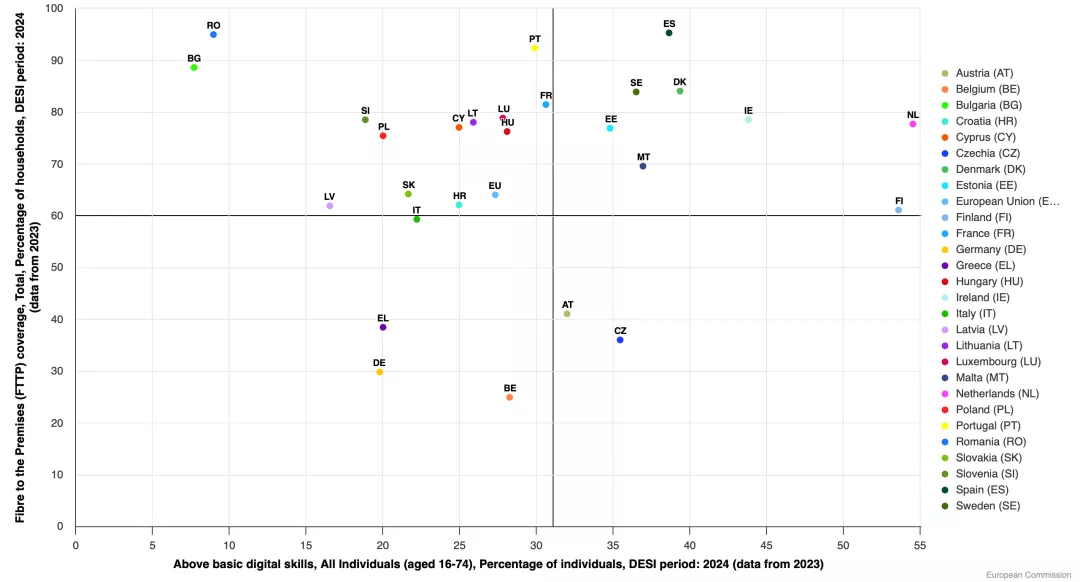
The highest reported percentage of people having above-basic digital skills is 54-55%, achieved by only two countries, while for the majority of countries, less than 30% of people do.
Explore the Digital Decade Report’s findings and make your own charts here.
Accelerating the deployment of digital infrastructure to reach all citizens is critical, but common challenges across the board make targeted support, collaboration and knowledge-sharing more vital than ever.
Until now, prohibitive deployment costs and bureaucratic hurdles have presented a significant barrier. A further challenge, affecting less developed regions the most, is a lack of capacity to prepare digital infrastructure projects, particularly in navigating regulatory requirements and dealing with commercial complexities. Compounding this is the incidence of market failure affecting rural and remote areas, where the combination of challenging geography, low population density, and far greater distances than in urban settings mean that there is little business case for private companies to invest. Public support and funding are vital in these instances.
Member States’ national and regional Broadband Competence Offices (BCOs) exist specifically to support and drive the deployment of broadband infrastructure, in particular where market forces will not reach. BCOs provide concrete support and guidance to help broadband project promoters with planning, financing and deployment.
Explore the BCO Network map to find and contact your national BCO.
Good practice spotlight: La Région Grand Est – France
Presented during the EU Regions Week event by Ms Marie Clotteau, Advisor in charge of environment, climate and agriculture at Grand Est – Europe, the region’s EU representation.
The French regional government of Grand Est is an active member of the BCO Network, which works with the European Commission to exchange knowledge and build capacity at national and regional levels, promoting cross-border peer learning.
As a region that is 94% rural, Grand Est offers a valuable example of implementing a region-wide strategy to overcome one of the key broadband challenges for rural and remote areas: market failure. The region’s plan enabled the deployment project to receive €33 million from the EU’s European Regional Development Fund (ERDF) through regional operational programmes. Complemented by the region’s resources, this project was able to deploy fibre across the entire territory, where 89% of the towns and villages are home to fewer than 3500 inhabitants.
By targeting the whole region, the project created a more significant market to attract private operators to join and invest. By following this up with a comprehensive Rural Pact plan, comprising a number of cross-community initiatives and services made possible by the new connectivity (among which digital literacy), the region is ensuring that the network will truly become the foundation for development, opportunity, greater quality of life, and stronger inter-connectedness between its municipalities and their inhabitants.
Discover and be inspired by more good practices in the BCO Network video series.
As we have seen, digital infrastructure alone will not close the digital divide: digital skills are essential for communities to be able to benefit from digital opportunities and tools. EU funding supports communities and regions in implementing a range of initiatives covering the basics, as well as more specialised areas such as coding or cybersecurity. These include, for example, digital literacy training programmes for citizens, SMEs and local governments. In addition, a number of EU-wide projects offer further support and connect stakeholders, including Digital4Business, the Digital Skills and Jobs Platform, Femme Forward, Code4Europe, CloudCamp4SMEs, Digital4Security, Skills4Retail, and many others.
Thriving and resilient
Once the fundamentals of infrastructure and skills are put in place, the door is open for even greater opportunities and innovations that can transform regions’ outlooks in terms of competitiveness and sustainability, leveraging all the latest technologies, such as AI, Big Data, and the Internet of Things. Advances in these areas can have an enormous impact on vital sectors, such as healthcare, education and agriculture.
Looking to the future, bridging the digital divide is ultimately how regions and citizens will be able to thrive, not only in the face of daily challenges but also in the wider global and environmental context. Building a digitally inclusive society will be key to this, enabling resilient, adaptable and empowered communities, as well as a stronger, more unified Europe on the global stage.
Author(s)
EU CAP Network
